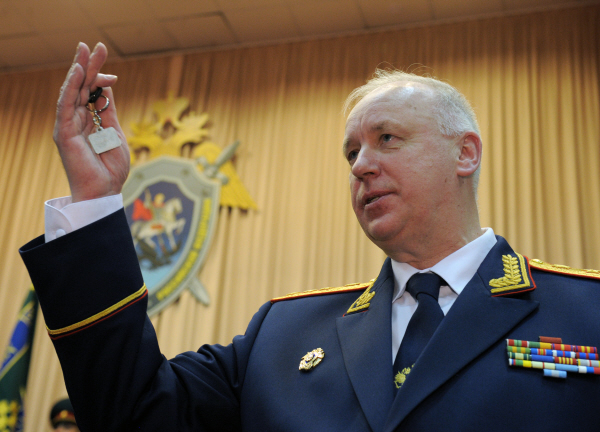Yevgenia Albats is a Russian investigative journalist who worked for the Newsweek International in the late 1990s. She is the chief editor of The New Times. – Ed.
September 30, 2013 will go down in history. On this day, President Putin signed decrees №№ 739-742, increasing by 2-2.5 times the monetary remuneration (salary plus bonuses) of security officials – from the Minister of Defence to the head of the FSB, the FSO (Federal Protective Service), the Chairman of the Investigative Committee of the Russian Federation, etc.
Starting September 1, 2014, the head of the Federal Security Service, Army General Bortnikov, will be getting more than the President of France, and 30% more than the Prime Minister of the oil-rich Norway.
In terms of his income the head of the Investigative Committee, General of Justice Bastrykin, came close to that of the Prime Minister of the Netherlands. A British Defence Secretary or the head of the BND (German secret service) can now envy our law enforcement officers: they are paid about $50 thousand a year less than, for example, the head of the Federal Drug Control Service, Ivanov, or the Federal Migration Service (FMS) head, Romodanovskiy.

Investigative Committee Chief Bastrikin’s income is nearly the same as Prime Minister of the Netherlands
In the U.S., the President may also decide on a bonus in addition to the salary of his political appointees, i.e. of a member of his cabinet. But Obama has a long way to go to match Putin’s generosity: the bonus is usually 35% of the salary.
And it should also be noted that in democratic countries they collect a progressive income tax, so the head of the BND, or the head of the British MI5, will have to pay to the budget from 32.5% to 42% of their income, and the security officials in Netherlands or Norway will pay up to 52%. But in Russia the head of the SVR (Foreign Intelligence Service) pays a meager 13% in taxes.
But it’s not just about numbers in absolute terms. It’s about the ratio between the average income of citizens and of those who are paid by the taxes withheld from citizens’ salaries. According to the studies by professor Guy Peters, a famous expert on bureaucracy, in the most backward African countries and under authoritarian regimes in Latin America, the gap between the average salaries of citizens and their rulers is the most significant. So, in a poor country like Burundi the salary of a minister is 15 times more than the average income of a citizen.
And here Russia also took the lead: once the remuneration of the security officials is increased next September, we will leave Burundi behind. The gap will be more than 20 times!
The question is why Putin suddenly decided to cajole security forces, despite the fact that the compensation of civil servants will not grow in 2014? Is he concerned about the widespread corruption? Not likely: the last ten years of endless increases of salaries of officials showed that the greed for something that doesn’t belong to you has little relation to the salary level. Those who were honest, remained honest, or left the government service to do business, but the corrupt officials have learned that there is always more money to get out there.
Is he trying to buy the loyalty of the security forces? Well, can they be even more loyal than now? Either by themselves or through their children they are providing a state security umbrella to control cash flows in the most lucrative sectors of the economy.
What if Putin sends a message across to both civil officials and oligarchs: here, these guys are the real power in the country. Well, there is nothing new about it. A lot has been written about the formation of a Russian militocracy, that is, a rule by people in military uniforms. However, the authors tried not to mention that what happened in Russia in the mid-2000s, was a de facto military (or rather, KGB) coup, and that people in uniforms occupied key positions in the administration, but not always and not necessarily visible. However, the third Putin presidency seems to set the record: the President himself, the head of his administration, a number of assistants and chiefs of the Presidential Administration departments, the Investigative Committee deputy chiefs, the General Prosecutor’s Office, and the most ministers – all came from the KGB.
And Putin somehow felt uncomfortable. Surrounded by fellow security officers he feels like he needs to throw some expensive candies at them. Does he insure against personal risks? That can’t be ruled out.